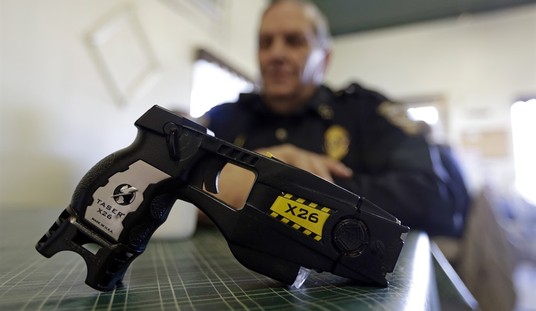AP Photo/Ed Andrieski
Violent encounters are terrifying. The average American goes through their life with a ray of sunshine always beaming down on them. They see violence on television, but not in real life. When that changes, though, it rattles them. It scares them on a visceral level. They’re not sure what to make of it.
For some, especially proponents of gun control who also have some degree of expertise they think is relevant, it confirms their worst fears.
While pumping gas, I witnessed the strongest argument for common sense gun control—the emotionally hijacked human brain.
It began with shouting and threats, followed by a pickup burning rubber as it lurched perilously between pumps. I exchanged glances with the wide-eyed gent in the next lane, who quickly noted, “If there’s gunfire, I’m outta here.”
Fortunately, the hothead sped off without creating a crime scene, but it proved an awful point: violence can erupt anytime, anywhere, anyhow. Why? Because, when triggered by some vexing person or event, many humans lack emotional self-control. Politics and ideology aside, this is a factual warning about the risks posed by the brain when emotionally compromised and in possession of lethal technology.
Whatever the weapon—guns and autos come to mind—when one’s psyche morphs from Dr. Jekyll to Mr. Hyde, anything can happen in the blink of an eye. School shootings, workplace violence, homicidal road rage and the like fuel the delusion among clueless politicians that all evil doers are mentally ill, and that we simply need better treatment. This is a common refrain after a mass shooting: Never mind gun control, we just need to keep these whackos locked up or drugged down.
Yet the author, psychotherapist Philip Chard, fails to note a few things.
In particular, how would “common sense gun control” prevent a situation like what he witnessed from getting uglier? Gun control is primarily about who buys and sells guns. When a violent confrontation happens–and it sounds like this wasn’t even violent except in the loosest sense of the term–people don’t rush out to buy guns, thus delayed thanks to a waiting period or whatever pie-in-the-sky idea Chard supports. No, they either have one, or they don’t.
Chard fails to note a single policy position that could have stopped that encounter from becoming more violent. Not a one.
Why is that?
Probably because there aren’t any, and what Chard doesn’t know is whether either of those individuals was armed. After all, talk is cheap, but most people aren’t eager to take human life, even when furious. Was one of them armed but restrained their anger so they didn’t do anything that they’d later regret? What were they arguing about? Hell, for that matter, if the human mind is so volatile, why didn’t they come to blows? Fists were handy, no pun intended. They could easily have gotten into a fistfight, so why didn’t they?
We don’t know, and that’s by design.
Chard’s efforts here are about framing emotions like “anger” and presenting it like the beginnings of one becoming unhinged and violent. Yet if that were the case, most household arguments would result in someone getting shot, wouldn’t they? While that does happen, and it happens far too often, it’s not exactly common either. The vast majority of arguments end in both parties eventually cooling off and either working it out or divorce.
Yet Chard doesn’t mention that. Instead, he wants to present the human animal as an emotionally-driven beast that can’t be trusted.
It’s hard to see what Chard thinks gun control would accomplish. Unless, of course, his idea of “common sense gun control” is complete disarmament. While that will never happen, even if such a law were to pass, that does seem like the only situation that could possibly prevent the unhinged, emotionally-driven human animal from completely flipping out and killing everyone.








Join the conversation as a VIP Member